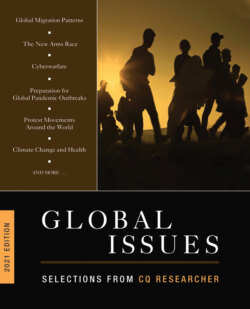Читать книгу Global Issues 2021 Edition - Группа авторов - Страница 29
На сайте Литреса книга снята с продажи.
Is war inevitable between the United States and Iran?
ОглавлениеIt is impossible to predict whether war will break out between the United States and Iran. But growing fears on the part of world leaders, regional experts and oil industry analysts demonstrate that they see such a conflict as likely unless something dramatic changes the course of events.
As tensions mount over Trump’s crippling sanctions and Iran’s escalating belligerency, desperate diplomatic efforts have been initiated to halt an apparently inexorable march toward a major conflict in the Persian Gulf, where nearly a quarter of global oil supplies originate.
First, European leaders last year created a barter mechanism to allow businesses to sell Iran food, medicine and other humanitarian supplies without going through the dollar-dominated global financial system. But companies, fearing U.S. sanctions nonetheless, have backed away. Then French President Emmanuel Macron tried unsuccessfully to arrange a meeting between Trump and Iranian President Rouhani on the sidelines of the recent United Nations General Assembly in New York.
Experienced former diplomats and Iran experts say a dangerous escalatory spiral is now in motion. Trump insists he wants to avoid a military clash, fearful that it would sink his 2020 re-election chances. So he has responded to Iran’s provocations with more sanctions and nonlethal cyberattacks.
But the sanctions pose what former IMF senior executive and diplomatic troubleshooter Hossein Askari calls an “existential threat” to thousands of impoverished Iranians. Among the Iranian leadership and ordinary citizens, experts say, that threat has stirred the country’s centuries-old Shiite code of resistance and martyrdom, all but guaranteeing more provocative Iranian behavior and growing chances of a war.
“The idea that you can conduct economic warfare against Iran without that leading to military confrontation and costs to the United States is unrealistic,” says Iran expert Parsi, noting that Secretary of State Pompeo last year advised Tehran to bow to U.S. demands “if your people want to eat.”22
“You can’t conduct that degree of economic warfare and expect nothing will happen,” Parsi says.
Many Iran experts regard Iran’s harassment and seizure of several foreign tankers this past spring as warning shots. And the highly destructive attack on Saudi oil facilities, they say, was meant to provide Washington and its Arab allies a taste of what Iran is willing to do if war breaks out. To make sure the Trump administration got the message, Iranian Foreign Minister Javad Zarif pledged “all-out war” if Iran is attacked, putting at risk the rest of Saudi Arabia’s oil infrastructure and the roughly 70,000 U.S. troops in Iraq and the Arab sheikdoms in the Persian Gulf.23
Patrick Theros, a former U.S. ambassador to Qatar, said the attack on the Saudi oil facilities was consistent with Iran’s asymmetrical warfare doctrine. Unable to defeat U.S. forces using conventional means, Iran aims to hurt the United States indirectly by targeting the world economy’s dependence on Persian Gulf oil and gas.
As the standoff with Iran intensifies, some military analysts say the Trump administration still has several options short of war to pressure Iran into compliance. Sabahat Khan, a senior analyst at Dubai’s Institute for Near East and Gulf Military Analysis, said these include Trump’s standing offer for negotiations, a proposal Iran adamantly refuses to accept unless sanctions are lifted first. Another is more sanctions, Khan said, and a third is cyberattacks targeting Iran’s oil production and critical economic infrastructure.24
But Chas Freeman, a former U.S. ambassador to Saudi Arabia, says without a diplomatic breakthrough, punitive measures will only draw increasingly belligerent responses from Iran, especially now that they believe Trump will not respond militarily. At some point, Freeman worries, Iran’s actions will cross a line that will leave Trump no option but a military response.
Freeman compares Trump’s maximum pressure strategy against Iran to President Franklin D. Roosevelt’s embargo on oil and rubber sales to Japan in the 1930s, aimed at halting Tokyo’s military expansionism in East Asia. As with Iran, Freeman points out, the sanctions hardened Japan’s resolve to resist U.S. intervention in regional affairs. Eventually, in a desperate bid to remain a major Asian power, Japan attacked the U.S. Navy in Hawaii, drawing the United States into World War II.
Freeman calls Iran’s escalating provocations against Trump’s sanctions “a very clear warning of what we know from past history—namely that if you corner a country, even if it’s not your military equal, at some point you pay a price for that.” At some point, he adds, “You get attacked.”
